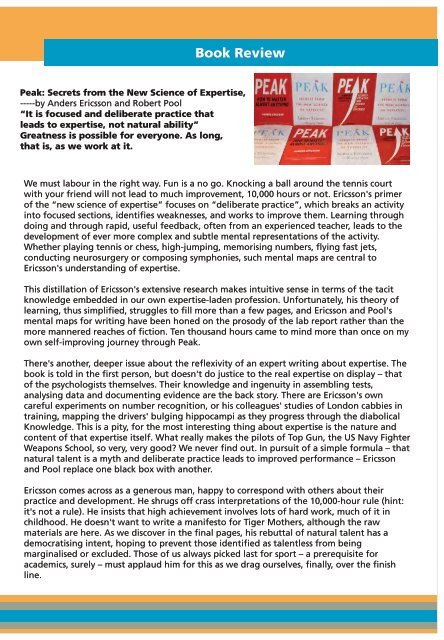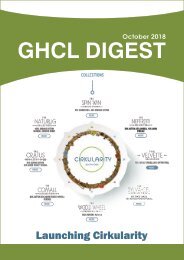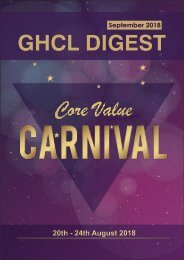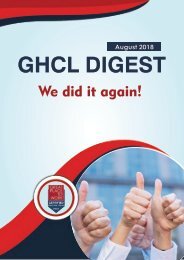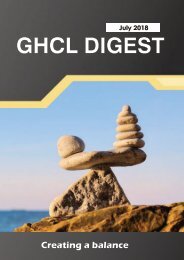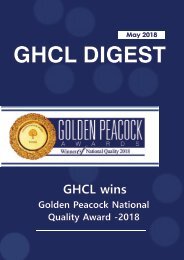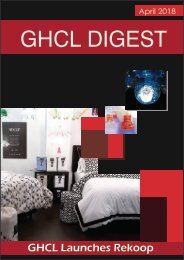GHCL Digest February Edition
GHCL Digest February Edition
GHCL Digest February Edition
- No tags were found...
Create successful ePaper yourself
Turn your PDF publications into a flip-book with our unique Google optimized e-Paper software.
Book Review<br />
Peak: Secrets from the New Science of Expertise,<br />
-----by Anders Ericsson and Robert Pool<br />
It is focused and deliberate practice that<br />
leads to expertise, not natural ability<br />
Greatness is possible for everyone. As long,<br />
that is, as we work at it.<br />
We must labour in the right way. Fun is a no go. Knocking a ball around the tennis court<br />
with your friend will not lead to much improvement, 10,000 hours or not. Ericsson's primer<br />
of the new science of expertise focuses on deliberate practice , which breaks an activity<br />
into focused sections, identi es weaknesses, and works to improve them. Learning through<br />
doing and through rapid, useful feedback, often from an experienced teacher, leads to the<br />
development of ever more complex and subtle mental representations of the activity.<br />
Whether playing tennis or chess, high-jumping, memorising numbers, ying fast jets,<br />
conducting neurosurgery or composing symphonies, such mental maps are central to<br />
Ericsson's understanding of expertise.<br />
This distillation of Ericsson's extensive research makes intuitive sense in terms of the tacit<br />
knowledge embedded in our own expertise-laden profession. Unfortunately, his theory of<br />
learning, thus simpli ed, struggles to ll more than a few pages, and Ericsson and Pool's<br />
mental maps for writing have been honed on the prosody of the lab report rather than the<br />
more mannered reaches of ction. Ten thousand hours came to mind more than once on my<br />
own self-improving journey through Peak.<br />
There's another, deeper issue about the re exivity of an expert writing about expertise. The<br />
book is told in the rst person, but doesn't do justice to the real expertise on display that<br />
of the psychologists themselves. Their knowledge and ingenuity in assembling tests,<br />
analysing data and documenting evidence are the back story. There are Ericsson's own<br />
careful experiments on number recognition, or his colleagues' studies of London cabbies in<br />
training, mapping the drivers' bulging hippocampi as they progress through the diabolical<br />
Knowledge. This is a pity, for the most interesting thing about expertise is the nature and<br />
content of that expertise itself. What really makes the pilots of Top Gun, the US Navy Fighter<br />
Weapons School, so very, very good? We never nd out. In pursuit of a simple formula that<br />
natural talent is a myth and deliberate practice leads to improved performance Ericsson<br />
and Pool replace one black box with another.<br />
Ericsson comes across as a generous man, happy to correspond with others about their<br />
practice and development. He shrugs off crass interpretations of the 10,000-hour rule (hint:<br />
it's not a rule). He insists that high achievement involves lots of hard work, much of it in<br />
childhood. He doesn't want to write a manifesto for Tiger Mothers, although the raw<br />
materials are here. As we discover in the nal pages, his rebuttal of natural talent has a<br />
democratising intent, hoping to prevent those identi ed as talentless from being<br />
marginalised or excluded. Those of us always picked last for sport a prerequisite for<br />
academics, surely must applaud him for this as we drag ourselves, nally, over the nish<br />
line.


